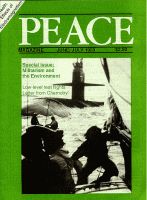
Peace Magazine Jun-Jul 1989, page 23. Some rights reserved.
Search for other articles by David Bennett here
Protecting workers from radiation
The nuclear industry is "intrinsically dangerous" in that it is virtually impossible to work in it without risking exposure to ionizing radiation. This form of radiation causes cancer, genetic damage, and birth defects. It is almost universally agreed that for these effects of radiation:
Dose limits are set by the International Commission on Radiological Protection (ICRP), a self-appointed group of "experts" formally commissioned by no one. In Canada, radiation protection is part of the mandate of the Atomic Energy Control Board (AEB), which follows the ICRP recommendations almost to the letter. On radiation protection, the AECB is unresponsive to public criticism and concerns. In six years, the impact of the Canadian Labour Congress (CLC) and its affiliated unions, on the policies of the AECB, has been minimal.
Radiation doses to workers must by law be kept down to 50 milliSieverts (mSv) per year and As Low As Reasonably Achievable. As it stands, this "ALARA" principle is unenforceable.
ICRP arrives at the numerical limit by risk calculations based mainly on Hiroshima-Nagasaki radiation exposure data. In doing so, the ICRP tends to use the most conservative (least damaging ) risk data and the concept of "acceptable risk" which is no doubt acceptable to technocrats, but not to the workers who undergo radiation exposure.
CLC policy on carcinogens (1986) is "zero exposure," which means that we cannot accept exposure limits based on "acceptable risk." We have argued for pragmatic limits of about one-tenth those of the ICRP/ AECB limits, which reflect the most pessimistic of the risk estimates and which are beginning to be accepted internationally.
For its part, the International Confederation of Free Trade Unions (ICFTU) has started to enter into a dialogue with the (U.N.) International Atomic Energy Agency (IAEA), with a view to the international regulation of nuclear power and a drastic tightening of radiation exposure limits. The work of the ICFTU is aimed at protecting the public as well as workers.
But the road is a hard one since the field has been commandeered by an international group of technocrats with strong links to the industry. They will not easily be dethroned.
David Bennett is National Health and Safety Representative for Canadian Labour Congress.

Peace Magazine Jun-Jul 1989, page 23. Some rights reserved.
Search for other articles by David Bennett here